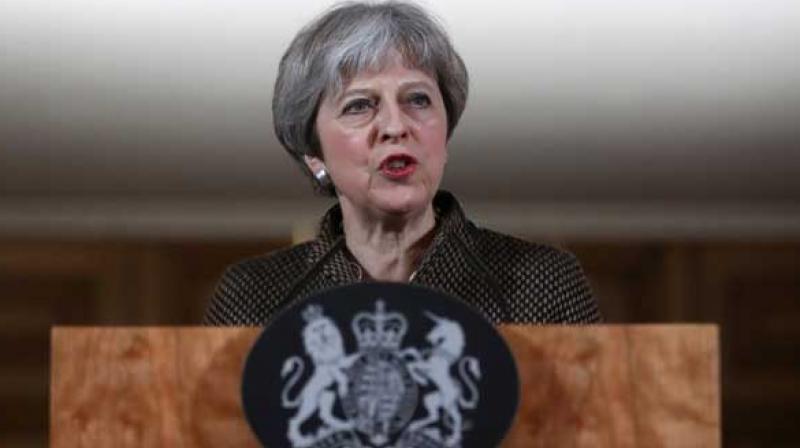UK wake-up call: Need for a rethink on Brexit

It was apposite that the pound sterling’s value rose as Britain’s Prime Minister Theresa May suffered what Leader of the Opposition Jeremy Corbyn gloated was a “catastrophic defeat”. Nothing else could have proclaimed more dramatically that if Britain doesn’t flourish in any other capacity, it will remain the favourite refuge for billionaires on the run, or, to quote Somerset Maugham on Monaco, “a sunny place for shady people”. But under no circumstances should British pique at having lost an empire and not found a role be allowed to destroy an international dream.
The size of Ms May’s defeat — 432 votes against only 202 for — doesn’t really matter. The political and constitutional consequences would have been the same even if she had lost by just one vote. The Conservative government would have had to evolve a new agreed basis for leaving the European Union on March 29. Faced with a similar crisis, another Prime Minister’s thoughts might have turned to some drastic remedy like a state of emergency or martial law. But as John Bright, the politician and reformer, had declared on January 18, 1865: “England is the mother of parliaments”. The nationalistic Scots and the revolting Irish are not averse to sharing in England’s glory.
If Britain savours this democratic tradition, it also enjoys a sense of history. As the people’s representatives turned their back on Ms May, Mr Corbyn no doubt kept his fingers crossed, hoping that history would repeat itself. A general election had to be held on October 29, 1924 — the third in less than two years — as a result of the defeat of Ramsay MacDonald’s minority Labour government on a similar motion of no-confidence. The Labour Party had lost 40 seats in that election even though its vote increased by around a million, possibly partly because it put up 87 more candidates than in the previous year. Labour might have emerged as the winner but for a forged letter that London’s Daily Mail newspaper had published four days before the voting. It purported to be a directive from Grigory Zinoviev, the Comintern head, to the Communist Party of Great Britain, the nursery where veteran Indians like Indrajit Gupta and Jyoti Basu had been nourished, ordering it to engage in seditious activities. It said that the resumption of diplomatic relations by a Labour government would hasten the radicalisation of the British working class. Outraged by this seeming Soviet interference in British politics, voters turned against the Labour Party.
It’s the sort of thing that Ms May and Donald Trump still harp on about, seeing today’s Russian Federation as a reincarnation of the “evil empire” that they believed the Soviet Union to be.
Labour’s loss was nothing compared to the 118 out of 158 seats lost by the Liberal Party, led by H. H. Asquith, whose great grandson, Sir Dominic Asquith, is the current British high commissioner to India. Stanley Baldwin’s Conservatives won a parliamentary majority of 209 so that British politics was polarised for ever afterwards between them and the Labour Party.
The guessing now is that Mr Corbyn, possibly the least charismatic member of Britain’s singularly colourless political cast, will fail to dislodge Ms May. The 118 or so Conservative MPs — from both the Leave and Remain wings of her party — who voted with the Opposition parties against her Brexit deal certainly haven’t turned coat and pledged their loyalty to Labour. Nor have the three Labour MPs who supported the Prime Minister’s deal become true-blue Tories. They can treat parliamentary politics as a game because remaining in the European Union is not seen as a party matter.
Even the blond, burly and bouncy Boris Johnson, the former foreign secretary, leading Brexiteer and seen as waiting for the first chance to push Ms May out of 10 Downing Street so that he can move in, says he would back her in Wednesday’s confidence vote.
Mr Johnson has a twofold interpretation of Parliament’s rejection of her Brexit proposal. First, it was a “bigger defeat than people have been expecting” — and means the deal is now “dead”. Second, it gives the Prime Minister a “massive mandate to go back to Brussels” to negotiate a better deal, without the controversial Northern Ireland backstop.
This 499-km land border between Northern Ireland, which is a part of the United Kingdom, and the Irish Republic seems to have been the most controversial sticking point. Many British politicians feel that Ms May’s fallback plan to avoid any return to physical border checks is not enough. The House of Commons debate showed Ms May needs more assurances from EU leaders.
The real need, however, is not for fresh negotiations in Brussels but for a rethink in Britain. Chuka Umunna, Labour’s bright young ethnic Nigerian MP, the Lib-Dem leader, Sir Vince Cable, and Scotland’s First Minister Nicola Sturgeon all suggest the holding of a second referendum. This time the British public will vote not in ignorance but in full knowledge of how dearly they will have to pay for Brexit. If, by chance, the confidence vote succeeds, Ms May will have no option but to either resign, or step down as Prime Minister and allow her party to choose another leader. Everybody knows who is anxiously waiting in the Tory wings. No matter what kind of Prime Minister Mr Johnson makes, the passing of Ms May — one of the least memorable political operators in the job — will hardly be lamented with sackcloth and ashes.
What matters far more is Britain’s future relationship with the most imaginative and successful move so far towards transnational unity.
The European Union inspired the Association of Southeast Asian Nations, the Gulf Cooperation Council and our own South Asian Association of Regional Cooperation. None of these adventures in supra-nationalism can succeed if other nations follow Britain and the original dream is allowed to wither and die.

